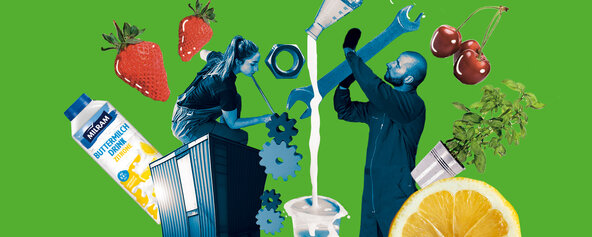
Ms. Schomacker, Ms. Bode, how do you come up with new products, what does the process look like?
Marina Schomacker: “A long corporate process is involved. That starts off with developing ideas and concepts then evaluating them and prioritizing them, to bring new or improved products to market maturity. A lot of areas within the company need to come together to move the process forward, including marketing, production, purchasing, logistics, food law, product and packaging developers. During the project, we are continually ask-ng ourselves, are we on the right track, can we achieve our goal, are we within the time schedule and the set budget? All employees can learn more about the process by looking at the DMK process portal. Everyone can see who is responsible for what and which checks and approvals are needed.”
Katja Bode: “To develop new food products successfully, it is essential that operational development and the overarching Centre of Expertise Research & Technology (CoE R&T) cooperate together. So for example during the development of new spreads (plant-based spreads for bread), we as the Science & IP team from the CoE R&T developed the analytical tools for characterizing and predicting the storage stability of the products. That meant analyzing new plant-based raw materials like beans or peas and assessing how well they would work in the final product. That accelerated the devel-opment process and saved on development costs. CoE input is also important for considering raw materials and trying out alternatives during the development process. One key thing to consider is ensuring the ingredients are available, for example, so we needed an alternative raw material for a stabilizer in butter-milk and found one by working together with the development department. By carrying out targeted tests during the development process, we could avoid using some resources unnecessarily.”
How much does teamwork matter?
Marina Schomacker: “Each and every one of us is a source of ideas! It is not only employees in research and development. We are very well connected with our suppliers and the supply industry. They tell us all about their projects and products, which we might be able to incorporate into our recipes. We also talk regularly with our marketing colleagues and discuss trends are they seeing and what consumers want. We learn a lot from customer and visitor feedback at trade fairs in Germany and abroad and use that to optimize our products and create new ones.”
What is product development focusing on in terms of dairy and vegan product trends?
Marina Schomacker: “Consumers are paying more attention to nutrition and health is more important to them. Regardless of whether our products are dairy or plant-based, we are paying attention to the ingredients and additives we use, and make sure we only add what is really necessary. There’s a big sign in our Brand unit encouraging that approach, it says, MILRAM without any frills! What’s more, when we develop new products, we try and reduce the amount of carbohydrates as far as possible. Even though many people like the taste of sweet products, as a society we need to rethink, and reduce our sugar consumption to a minimum for health reasons. That also applies to salt, which is not healthy from a nutritional point of view.”
What are you working on right now?
Katja Bode: “We are developing testing systems to help us predict product stability and raw material functionality in both plant-based and dairy-based products as soon as possible in the process. We want and need to understand better the interplay between raw materials, enzymes, the production process and storage parameters. We are particularly keen to work all this out early on so we can maintain product stability and a high level of quality.”
Marina Schomacker: “We are just about to launch our wild herb quark onto the market. It involves a whole new flavor experience thanks to ingredients like dandelion leaves, marigold petals and lovage. My message to the DMK team is you can already look forward to it, it’s going to be really tasty! We are also working on a vegan sour cream alternative that will be used for tarte flambée – a sort of flatbread pizza from western Germany and the Alsace region. That’s a special challenge, as the product gets hot and needs to brown slightly in the oven during the baking process.”
What has given you a particular sense of achievement?
Marina Schomacker: “Last year we introduced mandarin flavor MILRAM fruit buttermilk. Thanks to our research, we thought it would be popular. But the fact that it went down so well was a real sur-prise for us. And we also won a bronze award from Lebensmittelpraxis magazine for this great new launch.”


